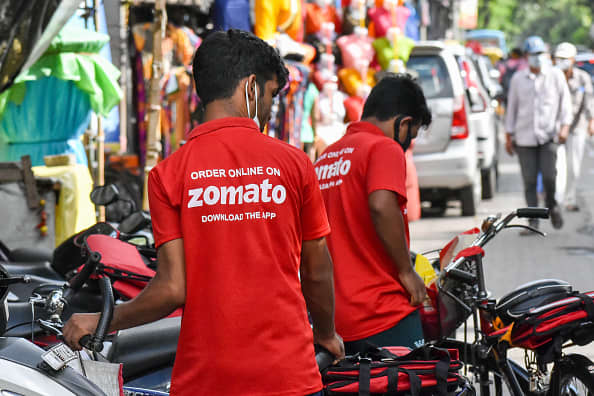Why investors remain bullish on India’s startup outlook for 2022
[ad_1]
A restaurant advertises the use of the Paytm digital payment system in Mumbai, India on Saturday, July 17, 2021.
Dhiraj Singh | Bloomberg | Getty Images
Indian tech start-ups will continue to attract capital from the private and public markets over the next year as they grow and mature, investors told CNBC.
There was a noticeable change in the country’s start-up environment in 2021, with several top companies making their stock market debuts. These include the Zomato food delivery app, payments giant Paytm and the parent company of the online insurance aggregator Policybazaar. Other start-ups are in the process of IPO, including ridesharing company Ola and Indian hotel chain Oyo.
Indian tech start-ups have also raised a record amount of capital from private equity and venture capital firms. These investors have injected $ 28.2 billion in technology investments this year in 779 deals, according to reports from Asian private equity and venture capital intelligence provider AVCJ. This marked a 200% jump in equity from the $ 9.4 billion invested last year.
Rajan Anandan, managing director of Sequoia Capital India, told CNBC this month that the venture capitalist was “very optimistic” about the Indian tech ecosystem and its ability to generate long-term value for stakeholders.
“The success of the companies in national and international trade has certainly attracted increased interest from investors around the world,†Anandan said. Sequoia Capital India has seen eight portfolio companies debut on the stock exchange in 2021, he added.
“It validated that great companies can be built out of this region – and create significant shareholder value. And with several promising IPOs slated for next year, we expect this trend to continue. continues, â€Anandan said.
Investor appetite for new technology IPOs
The reception of some of the high tech IPOs in India has varied among investors. While Zomato shares have made a strong debut and are up around 5.44% since their first day of listing on July 23, Paytm is down more than 13% from its debut on November 18.
Another digital payment company, Mobikwik, delayed its IPO after the disappointing start of Paytm. As such, FinTech companies and their ability to generate revenue and possibly profit are under intense scrutiny, according to local media.
Nonetheless, there will likely be an appetite for future IPOs, according to Nikhil Kamath, co-founder of Indian brokerage platform Zerodha. The bigger question, however, would be how these companies fare in the longer term, he told CNBC.
Kamath pointed out that many tech start-ups, including some that have gone public, remain overvalued.
“The majority of these [companies] aren’t profitable and it doesn’t look like they will be in the next four or five years, so it’s a little difficult to justify the valuation, â€he said.
When looking at a startup, investors need to separate the valuation of the business – which is determined by the public market – and its fundamentals, according to Sandeep Naik, head of India and Southeast Asia. within the global investment firm General Atlantic.
Speaking to CNBC’s “Street Signs Asia†earlier this month, Naik said early stage and growth-stage investors have made a lot of money in India over the past two years. This is in part because of the exits, he said, which allowed them to inject additional capital into the Indian tech ecosystem and help start-ups grow.
An exit occurs when a founder sells his start-up to a larger company or goes public through an IPO.
Zomato’s food delivery partners in Kolkata, India.
Debarchan Chatterjee | NurPhoto | Getty Images
“In the last 18-24 months you’ve seen how many IPOs are happening, which companies are going IPO, how companies have traded and they have exited, which gives you an excellent validation of what global capital markets are looking for in our region as one of the most attractive regions to invest in growth, â€said Naik.
And after?
While start-ups are expected to continue attracting capital in 2022, the pace of fundraising and growth may slow comparatively.
That’s because there was a lot of pent-up demand this year around funding rounds that were due to take place in 2020, but were postponed due to the Covid-19 pandemic, according to Amit Anand, founding partner of Jungle Ventures. .
“If I take all of the fundraisers that have taken place this year and maybe spread them out over 2020 and 2021, then the picture is different,†he told CNBC.
The image still shows India as a growing market, but shows steady, longer-term annual growth instead of a one-time spike, Anand explained. For international investors like Singapore-based Jungle Ventures, he said India is a strategic market and bets are usually long-term.
“This is all credit to the local entrepreneurs and the local investor base who have built the ecosystem to a point where it is able to attract that kind of global capital because the growth rates are there and the maturity is there. enterprises [is] over there, â€Anand said.
Sequoia’s Anandan added that unprecedented liquidity due to ultra-accommodative monetary policies by global central banks has helped push fundraising levels in 2021 to new highs.
The Indian market is also deepening and the quality of talent is improving, he said. The pandemic has accelerated the adoption of technology, which has resulted in many start-ups growing much faster than before – and as long as they are able to show their scale, funds will continue to flow, a said Anandan.
Nonetheless, start-ups will face headwinds, both when raising funds and when entering public markets. This includes navigating a slow economic recovery in India and inflationary pressure as well as the normalization of global central bank policies. like the US Federal Reserve.
[ad_2]


Comments are closed.